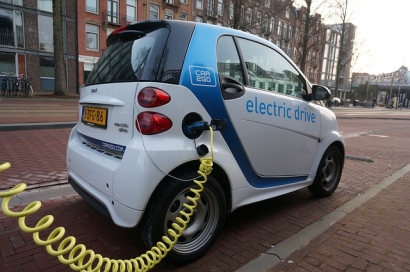
Leasing an EV carries many of the same benefits as leasing an internal-combustion engine (ICE) vehicle:
Warranty protection
Since a vehicle lease term typically lasts anywhere from 24 to 39 months, the chance of any major issues occurring is low. However, if anything does go wrong, the vehicle is covered under the manufacturer's warranty, and the dealership or leasing company will handle any repairs.
Lower monthly payment
Since you only need to pay for a leased vehicle for the length of your contract, the monthly payment will be lower than if you purchase a vehicle.
Loyalty discounts
To incentivize customers to stay with a certain vehicle brand or model, manufacturers will sometimes offer leasing discounts at trade-in time.
In addition to the above, individuals and fleet managers who lease EVs enjoy a few unique benefits:
Access to the newest technology
Since EV manufacturers are constantly innovating, owners of EVs run the risk of missing out on technology upgrades and being unable to sell their soon-outdated models. But when a 24–39-month lease term is up, lessees can stay on the cutting edge, enjoying upgrades like greater driving range and faster charge times.
Potential tax credit savings
EV owners in the U.S. can take advantage of a federal tax credit of $7,500 the year following their purchase. However, if one were to lease an EV, the leasing company may immediately apply those savings to the monthly fee, meaning the customer would save money immediately.
However, not all incentives transfer to lessees.
Leasing companies and dealerships are not obligated to pass tax credits and other savings to customers. Always check the terms of an EV lease agreement to see if you’re missing any potential savings.
General leasing considerations also apply, including the need for excellent credit, strict contract terms, the inability to customize or sell, and usage restrictions (like not using the vehicle for business).
If you'd rather purchase than lease, here are some specific benefits only EV buyers can enjoy:
Purchasing incentives
In addition to the federal tax credit, new EV owners may be eligible for local and state credits on their next tax return. Dealers also run frequent EV promotions to increase sales volume, which can potentially save buyers thousands of dollars.
Long warranties
EV batteries tend to degrade at a faster rate than those in ICE vehicles, since EV batteries provide the vehicle’s sole source of power. Fortunately, many EVs carry federally mandated warranties that cover their batteries for eight years or 100,000 miles.
On the other hand, buying an EV comes with some conditions to be aware of:
Battery life
EV batteries do eventually degrade over time (hence the long warranty), but most fleets cycle out their vehicles well before this deadline. This is good news for fleet owners, since EV batteries are costly to replace. Best charging practices may help extend battery life.
Uncertain future value
Changing technologies, environmental regulations, and consumer behaviors make it difficult to forecast exactly how the EV market will evolve in the coming years. EV buyers should keep this in mind, as their new vehicle(s) might not command the highest resale value when it’s time to sell.
Be sure to do your research before making any commitments, and keep an eye on changing trends and technologies.
About the Author: Lisa Drake joined Merchants Fleet in 2021 as Program Manager of Fleet Electrification. Drake brings close to three decades of environmental and sustainability expertise to help Merchants drive electrification in the fleet industry.

